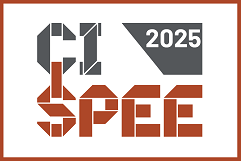Detailed Program
 Back to the Summary Program Page
Back to the Summary Program Page
Wednesday, 16 July 2025 - Local: Polytechnic University of Setúbal - Setúbal School of Technology
| 08:00 – 09:00 | Welcome Registration and Info Desk | ||||
| 09:00 – 09:30 |
Opening Session - (Room: Auditorium 2) Luísa Torre, Dean, Setúbal School of Technology / IPS Pedro Neto, Dean, Barreiro School of Technology / IPS André Silva, President, Portuguese Society for Engineering Education (SPEE) Ângela Lemos, President, Polytechnic University of Setúbal |
||||
| 09:30 – 10:30 |
Plenary Session I - (Room: Auditorium 2) Talk: LEARNING AS A DRIVER FOR DEVELOPMENT |
||||
| 10:30 – 11:00 | Coffee Break | ||||
| Paralel Session I 11:00 – 12:00 |
Session IA (Room: Auditorium 2) Reimagining Engineering Education Through Artificial Intelligence |
Session IB (Room: Auditorium 3) Empowering Engineers with Transferable Skills: From Self-Learning to Communication |
|||
|
Paralel Round Table I 12:00 – 13:00 |
Round Table IA - (Room: Auditorium 2 ) Cybersecurity and Engineering Education |
Round Table IB - (Auditorium 3) Philosophy of Engineering in High Quality Higher Education |
|||
| 13:00 – 14:30 | Lunch | ||||
|
Paralel Sessions II 14:30 – 15:30 |
Session IIA - (Auditorium 2) Educating Engineers for the 21st Century: Leadership, Skills Taxonomies, and STEAM Integration |
Session IIB - (Auditorium 3) Transforming Engineering Education: Pedagogical Innovation and Virtual Technologies |
|||
| 15:30 – 16:30 |
Plenary Session II - (Auditorium 2) Talk: Engineering Education and the Wild World of Generative AI |
||||
| 16:30 – 17:00 | Coffee Break | ||||
|
Paralel Workshops I 17:00 – 18:30 |
Paralel Workshop WSI.1 Interdisciplinarity in Engineering Education - (Room: Auditorium 2)Susana Lucas, Cristina Oliveira WSI.2. A Hands-On Session from a Student Perspective: Combining Experiential Learning and Team-Based Learning - (Room: Auditorium 3) Margarida Pinho-Lopes and Joaquim Macedo WSI.3. Capacity Building for Engineering Education Practice and Scholarship in Lusophone Countries: Where are we and where do we want to go? - (Room: Auditorium 4) Matheus de Andrade, Valquiria Villas-Boas, Ines Direito and Bill Williams |
||||
| 18:30 – 19:30 | Welcome Cocktail - Cultural and Social Event / Networking | ||||
Thursday, 17 July 2025 - Local: Polytechnic University of Setúbal - Barreiro School of Technology
| 09:00 – 09:30 | Welcome Registration and Info Desk - Hall of Barreiro School of Technology | ||||
|
Paralel Sessions III 09:30 – 10:30 |
Session IIIA - (Room: Anf. 0.01) Human-Centered Engineering Education: Inclusion, Emotion, Reflection and Sustainability |
Session IIIB - (Room: Anf. 1.01) Learning by Doing: Active Pedagogies in Chemistry and Biotechnology |
|||
| 10:30 – 11:00 | Coffee Break | ||||
|
Paralel Sessions IV 11:00 – 12:00 |
Session IVA - (Room: Anf. 0.01) Transforming Engineering Education: From Narrative Learning to Digital Immersion |
Session IVB - (Room: Anf. 1.01) Innovating Mathematics, Adaptive and Intelligent Approaches in Engineering Education |
|||
|
Round Table II 12:00 – 13:00 |
Round Table II - (Room: Anf. 1.01) E4E - Open Debate About Engineers Future |
||||
| 13:00 – 14:30 | Lunch | ||||
|
Paralel Workshops II 14:30 – 16:30 |
Paralel Workshop II WSII.1. Applied Gamification in Engineering Education - (Room: 0.02)Fausto Mourato, Martinha Piteira WSII.2. Curriculum Design for an Expedition Learning Semester on Energy Sovereignty Engineering - (Room: 0.08) Siegfried Rouvrais, Gilles Jacovetti, Haraldur Auðunsson and Arlinta Barus WSII.3. Engineering for All: Redesigning Education for Diversity and Inclusion - (Room: 1.04) María Dóval Ruiz, Rita Pereira and Cristina Borges WSII.4. Embedding empathy in engineering design courses: - (Room: 1.02 ) Jan Van Maele, Veerle Bloemen, Diana Bairaktarova and Inês Direito |
||||
| 16:30 – 17:00 | Coffee Break | ||||
| 17:00 – 18:00 |
Plenary Session III - (Room: Anf.1.01) Talk: Professional Roles for Future Engineers, a driver of diversity |
||||
| 18:00 – 19:00 | Cultural and Social event / Networking / Laboratory visit | ||||
| 20:00 – 23:00 | Conference Dinner | ||||
Friday, 18 July 2025 - Local: Polytechnic University of Setúbal - Setúbal School of Technology
| 08:00 – 09:00 | Welcome Registration and Info Desk - Hall of Setúbal School of Technology | |||||
|
Paralel Sessions V 09:00 – 10:00 |
Session VA - (Room: Audit.3) Innovative Lab-Based Learning in Engineering: Structures, Machines, and Design |
Session VB - (Room: Audit.2) Engineering Assessment: From Practice-Based Evaluation to AI-Enhanced Tutoring |
Session VC - (Room: Audit. 4) Educating Engineers for Impact: Integrating Skills, Doctoral Innovation, and AI-Driven Learning ID26. Empowering Engineers with Communication Skills for Green Technology Projects |
|||
| 10:00 – 10:30 | Coffee Break | |||||
|
Paralel Workshops III 10:30 – 12:30 |
Paralel Workshop III WSIII.1. Teaching and learning basic electronics through remote experiments – VISIR and HIVE - (Room: Audit. 3 )Gustavo R. Alves, Unai Hernández-Jayo, Javier García-Zubía, André Fidalgo WSIII.2. Critical Minds in Action: AI-Enhanced Service-Learning and CBL in Engineering - (Room: Audit. 2 ) Celina P. Leão, Anabela C. Alves, Sílvia Araújo and Filomena Soares WSIII.3. Supporting the Digital Transformation of Engineering Education with ANSYS Computational Simulation Tools - (Room: Audit.4 ) Ansys
|
|||||
| 12:30 – 13:00 |
Best Paper / Next CISPEE2027/ Closing Conference CISPEE2025 - (Room: Auditorium 2) Adriana Tonini, President, Brazilian Association for Engineering Education (ABENGE) André Silva, President, Portuguese Society for Engineering Education (SPEE) Catarina Delgado, Program Chair CISPEE2025, Polytechnic University of Setúbal |
|||||
